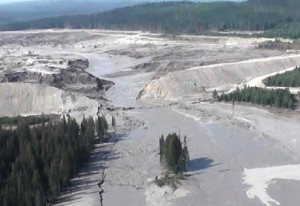
British Columbia officials introduced law changes last week that would strengthen their ability to enforce mining laws in response to the Mount Polley tailings dam disaster of 2014. But critics in Alaska are not convinced the B.C. government would use those penalties to protect watersheds in Southeast.
Under the new laws, British Columbia’s Ministry of Energy and Mines would be able to fine mining companies for safety violations without taking them to court.
The changes were recommended by an independent panel that investigated the Mount Polley mine disaster. A dam failed at that mine and spilled millions of gallons of waste into a salmon-bearing watershed.
B.C. Minister of Mines Bill Bennett said his ministry’s tools for compliance and enforcement of mining in the province are too limited.
“What the administrative penalties are going to do is allow us to deal with noncompliance that is perhaps somewhat less serious,” Bennett said. “So it’s not the level where you take a company to court and have them fined for a million dollars or see some term of imprisonment; it’s more of a noncompliance issue that if you add them up, recurring circumstances can become more serious.”
Penalty amounts have not been established yet, but Bennett said they could range from $2,000 to $500,000.
The legal changes would also increase maximum penalties if the government takes a mining company to court. The maximum fine jumps from $100,000 to $1 million, and the maximum prison term increases from one year to three years.
Currently, the B.C. government can punish mines for noncompliance by canceling permits, issuing a stop-work order, or pursuing prosecution in court. The ministry considers administrative penalties to be more efficient and effective.
But mine critics in Alaska say this will not make a difference unless the ministry uses the penalties.
Jill Weitz of the Salmon Beyond Borders campaign called the change a small piece of the puzzle.
“I think that it’s a good first step, but historically in Canada there’s a big difference between theory and practice,” Weitz said. “And so there have been penalties–in the sense of permits being stopped or held up by the B.C. government–that have not been utilized. And so it will be interesting to see if the administrative penalties are utilized.”
Chris Zimmer of Rivers Without Borders noted that B.C. has not taken enforcement action against the closed Tulsequah Chief mine, which is leaking pollution into a tributary of the Taku River near Juneau.
Bennett said the ministry recently issued an order to that mine asking it to fix the problem, and one of the new administrative penalties could be used if the company does not comply. He also said administrative penalties would not have prevented the Mount Polley disaster.
Additional law changes are expected this year as B.C. continues to addressrecommendations that came out of the Mount Polley investigation. All changes will have to be approved by B.C. lawmakers.




